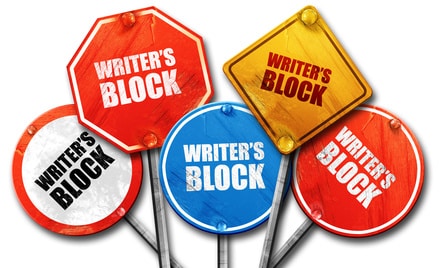Want to know how to stop writer’s block? This article shares the most complete and nuanced definition of writer’s block you’ll find online, along with my best tips about how to deal with writer’s block. No matter what type of material you’re writing, or how long you’ve been writing, at some point you’ll need help to learn how to beat writer’s block. Especially if you’re an author who wants to get (and keep) one of the top book agents in our Directory of Literary Agents and a traditional publisher like Random House.
If you believe you’ve never had writer’s block–or you believe you never will–think again. I’ve been in the publishing industry (and been a writer myself) for more than a decade and I know that, at some point, every writer needs writer’s block help. I saw it when I was a literary agent, then again when I was the Marketing and Licensing Manager for a well-known book and greeting card company, and now, yet again, as an author coach.
Writers who say they’ve never had writer’s block haven’t written enough, they’re not being particular enough about the quality of their writing, or, they’re like those those people in long-term romantic relationships who say they don’t ever have disagreements or fights (which is simply another way of saying they’re passive-aggressive or lapdogs who don’t speak their mind). I don’t trust those people and you shouldn’t either. So, if you want to be a better writer and enjoy the writing process more, let’s talk about the definition of writer’s block and how to stop writer’s block. There are many cures for writer’s block, not just one.
Definition of Writer’s Block – How to Stop Writer’s Block
 What is writer’s block and what are the best ideas regarding how to stop writer’s block? Edmund Bergler, a psychiatrist, in the 1940s, introduced the term “writer’s block” and defined it as writers suffering from “neurotic inhibitions of productivity”. I don’t think you need to be neurotic to have writer’s block, and I don’t think you need to to therapy to get unstuck. I also have a broader definition of what writer’s block is. In my experience, writer’s block can be certainly be defined as a lack of words or productivity. But writer’s block can also mean a lack of words that make you feel inspired or proud of your writing. It can mean a lack of ideas. Or it can mean you have so many good ideas that you’re having difficulty choosing the best one(s). Writer’s block can also mean “bad flow” (partial writer’s block). In other words, you might be getting words to appear on the page and cooperate, eventually, but the process is taking too long and/or you’re not enjoying the journey.
What is writer’s block and what are the best ideas regarding how to stop writer’s block? Edmund Bergler, a psychiatrist, in the 1940s, introduced the term “writer’s block” and defined it as writers suffering from “neurotic inhibitions of productivity”. I don’t think you need to be neurotic to have writer’s block, and I don’t think you need to to therapy to get unstuck. I also have a broader definition of what writer’s block is. In my experience, writer’s block can be certainly be defined as a lack of words or productivity. But writer’s block can also mean a lack of words that make you feel inspired or proud of your writing. It can mean a lack of ideas. Or it can mean you have so many good ideas that you’re having difficulty choosing the best one(s). Writer’s block can also mean “bad flow” (partial writer’s block). In other words, you might be getting words to appear on the page and cooperate, eventually, but the process is taking too long and/or you’re not enjoying the journey.
Here’s an example…
My wife, Ingrid, sent me a story recently about the top fortune cookie writer in the United States, Donald Lau, who recently quit after 30 years due to writer’s block. Mr. Lau, the 68-year-old former Chief Fortune Writer for Wonton Food Inc. saw his little dumplings of wit and wisdom wrapped into 4.5 million fortune cookies each day. Having a massive following like that can result in a lot of pressure and creative choking. But writer’s block can also be caused by other things: agent and publisher deadlines; a writer’s previous failures and successes; nasty comments posted by “fans” and critics; and/or a writer’s fears, impatience, or perfectionism. In fact, more often than not, writer’s block is mostly caused by the rules, restrictions, expectations, deadlines, and beliefs writers impose on themselves. And, it’s important to note that any type of writer can get writer’s block. Writers of all types of writing and all book genres. Established writers. And, of course, new writers, who are the most susceptible. So, let’s talk about how to stop writer’s block.

How to Beat Writer’s Block – List of the 35 Best Cures for Writer’s Block
This list of 35 ideas regarding how to stop writer’s block is comprehensive. That’s because some of the strategies below aren’t going to work for you. Not all writers and created equal, your preventive measure or cure for writer’s block is going to be different than someone else’s. So, read the list of writer’s block cures below and implement those that resonate most with your psyche and personality. And, please note that these strategies about how to stop writer’s block are listed randomly. In other words, the entries at the bottom of this list of ideas about how to stop writer’s block are just as good as those at the top.
1. Don’t tell yourself writing can (or should) be easy, fun, or glamorous. Sometimes writing is easy, fun, and/or glamorous. Sometimes it’s not. If you ask most successful writers, they’ll tell you that most of the time writing doesn’t make them feel like a kitten with a new ball of string. But they’ll also tell you it’s okay… and it’s worth it in the end.
2. Don’t think of writer’s block as writer’s block; think of it as a normal part of the writing process. If writing was easy, more people would do it well. But it’s not, and they’re not. That’s why it’s critical for you to understand and follow these suggestions. If you do, you’re much more likely to be an inspired writer but also a rational and successful writer.
3. Stop each writing session while you’re in the middle of a sentence or paragraph that’s going well, instead of stopping when you’re finished or stuck. That will make the start of every subsequent session seamless and get you back into a productive rhythm quickly.
4. Remind yourself that creativity follows commitment. Simple fact. When we decide to make something happen, we’re much more likely to figure out how to make it happen–and then make it happen. Want to know how to stop writer’s block? Acknowledge that it’s a choice. A decision.
5. Strive to be inspired, but don’t wait for inspiration to strike. This may sound awful at first, but bear with me: You don’t always need to feel inspired, especially if you’re a serious writer who writes a lot. If you want to write and/or publish professionally, logic needs to sometimes (often) override feeling and emotion. You should always strive to feel inspired, but writing consistently and getting results needs to be just as important if you want to be a published writer–not just a hobbyist.
6. Even if your writing feels like crap, and you feel it reads like crap, write. Sometimes (often), powering through things leads to positive results. Writing is no different. Any writing is better than no writing. It’s a great first step. And, once you stop writing, it can be hard to get started again. Most authors don’t realize this, but most successful writers are quick to admit they write sh@#$y first drafts. Who cares, they say. That’s what editing is for. You can’t rewrite your way to genius or publishable work if you don’t have a first draft. Even if it sucks.
7. Take a break and do something unrelated to writing for a while. In particular, you should do some things that get your body moving physically and get you out of your head. Use your imagination. After all, you’re a writer. Want to know how to stop writer’s block? Stop writing. At least for a while.
8. Reward yourself. Although many writers don’t like the act of writing, all authors like the feeling that follows finishing a solid writing session. That sense of accomplishment can be a reward in and of itself. But it also can’t hurt to have a little something special planned for when you’re done. Again, I’ll leave that up to you and your imagination.
9. Write about something else–unless you’re a serial starter who loves launching lots of literary ships but never ends up guides them to their final destination. Want to know how to stop writer’s block? Force yourself to finish the writing project you’re working on before you start another one.
10. Upgrade your writing environment. Your words and ideas (what happens in your head) matter most as a writer, but creating a harmonious and beautiful writing environment can also be important. Make your writing room (or writing corner) visually appealing. Listen to music that stimulates or calms you, depending on your personality and the type of writing you’re doing. And get noise-canceling headphones, if needed, to block out the sound of your kids’ playing upstairs; your spouse watching television in the other room; or your neighbor’s yappy dog in the backyard, ten feet from your sacred space.
11. Write somewhere else. I’m not talking about spending oodles of money to go to a weekend writers’ conference, month-long exotic writers’ retreat, or writers’ cruise (yes, there are such things). I’m talking about simply putting yourself in a different place than the place you usually write in. Maybe a different room in your house or apartment. Maybe a coffee shop or library. Maybe a hotel. Just break your existing writing pattern or lack thereof.
12. Try to be the best version of yourself–instead of someone else. Write what you write best, in the way you write best. Want to know how to stop writer’s block? Stop looking enviously at other writers. Your only real competition, while you’re writing, is you.
13. Maintain an idea file. I love smartphones because they make it easy to make notes and send yourself reminders. I have a note file on my phone with more than a hundred article ideas that I started maintaining six years ago. Sometimes I’m out with Ingrid having dinner and think of something. I always whip out my cell phone to capture the idea for later. You know how it is. Those good ideas we always think will come back later, because they’re so good, often don’t!
14. Give yourself enough time to write. Don’t be delusional and think the first draft of anything you write is great. Even if it’s “inspired” or “channeled” from God or the universe. Don’t tell yourself that you can or should be able to write quickly, either. We live in an instant results and instant gratification society where people grossly underestimate the amount of effort and insight it takes to achieve mastery of anything. Yes, smart shortcuts are a good thing and I share a lot of them with my author coaching clients. But there’s only so much you can do to speed up the process of producing quality writing. You also need to let your writing–and yourself–breathe.
15. Don’t give yourself too much time to write. If you give yourself too much time to do anything, ironically, you can produce less… and it can end up being lower quality. Want to know how to stop writer’s block? Don’t leave things open-ended. Having deadlines and time limits challenges us to focus and ratchet up the intensity a bit. The trick is to do it in a productive way, of course, not do it in a destructive way that stresses you out too much and/or paralyzes you.
16. Plan/outline/plot (or not). Some writers save a lot of time and headaches by mapping out as much as possible before they begin writing and/or the do additional planning, outlining, or plotting along the way. You should certainly stay open to surprises your muse or characters might reveal while you’re writing, but there’s also wisdom in figuring out (as much as possible) where you’re going, before you try to get there.
17. Have a set day of the week to write and experiment until you figure out if some days are better for you than others. It doesn’t have to be every day, but you should write every week. Even if it’s not a lot. Otherwise, it’s difficult to get momentum or achieve anything significant. And, when I say writing time, I mean writing time. Not editing, coming up with new ideas, doing research, checking email, surfing the Internet, or organizing paperclips. Just writing. Schedule separate time for the other things. As someone who loves psychology, I can’t stress enough the importance and benefit of simple cognitive (how you think) and behavioral (what you do) shifts. For example, I had an embarrassingly long stretch (seven weeks) during which I didn’t write or publish my “weekly” newsletter earlier this year. It wasn’t because I was lacking ideas. It was because I hadn’t yet given myself a set time to write each week. Now that I have a set day of the week to create my newsletter, and a set day that it’s get published (Saturday), it’s getting done–and I’m enjoying it!
18. Experiment with different times of day. Like experimenting with different days of the week to write, try different times of day as well.
19. Figure out (or remember) why you write. Read my article here called Why Writers Write. Getting to the heart of why you write, which is likely many reasons, is one of the best strategies regarding how to stop writer’s block.
20. Read your “competition”. Too many writers I talk to as a coach are scared (at least initially) to read other writers’ work. Sometimes they’re worried it’s going to negatively impact or influence their own writing. Other times they’re worried it’s going to intimidate them and make them feel they don’t have something original to say, or a beautiful enough way to say it. But, at some point–before, during, or after you’ve finishing writing something–if you want to know you’ve produced something special, you’ll need to study comparable/relevant writings and compare/contrast yours. And possibly make some changes. Don’t be afraid; it must be done, and it will help you make your work even better.
21. Read things that aren’t written by your competition. That’s one of the best ways to learn and incorporate new ways of seeing and doing things that will make your writing richer and help you stand out from the competition. Want to know how to stop writer’s block? Don’t get in a rut or let yourself become predictable.
22. Feed your mind and/or spirit with something that inspires you and nurtures your soul. Read a book, magazine, or newspaper. Watch a movie, documentary, or new TV series. Go to an art gallery, museum, or place of worship. Attend a concert or show. Take a class. Travel somewhere new (even if it’s local). Listen to a motivational speaker. Volunteer for a charity. Again, you’re a writer. Use your imagination.
23. Google online to find writing exercises and games to help get your creative juices flowing. The exercises might be completely unrelated to your type of writing or topic material, but opening yourself up to the process of writing exercises and games might give you an insight or idea that jump-starts or improves your flow or final product.
24. Start small. Break big writing projects into small, manageable pieces that are easier to wrap your head and schedule around.
25. Eat something. Creativity requires fuel and writers struggling with writer’s block shouldn’t have empty stomachs. Just make sure you eat something before you start writing. Otherwise, that trip to kitchen or the mere act of snacking can become an excuse to leave the laptop or a destructive distraction.
26. If you’re bored, write something different or write in a different style. Everyone says you should write what you know, but you can also write about something you’re curious about and/or know absolutely nothing about. In my view, the worst thing you can do as a writer is be boring. And the easiest way to produce boring writing is to be bored while you’re writing it. So, give yourself permission to have fun. Or, better yet, make it a requirement.
27. Imagine you’re writing to a specific person. Remember, writing is communication. At least it should be. Not just entertaining yourself, or therapy. Don’t get lost in your head and don’t fall in love with yourself, your ideas, or the sound of your voice. Stay focused on how your readers are going to experience your writing. Is it clear and engaging or self-indulgent and confusing?
28. Put yourself in an environment, locally or online, where you’re forced to be confronted with other writers who are consistently writing. This simple strategy can inspire you and/or make you uncomfortable enough to get you writing more consistently. It could be a free writing class, a writers’ group, or something else. Just don’t sell yourself on the idea that the best writers are anti-social introverts who do absolutely everything in isolation. Being a loner doesn’t make you a genius, a better writer, or a better human being. It makes you weird.
29. Allow yourself to be held accountable. Tell someone about your writing goals. Someone who’s going to hold you accountable. I don’t care how independent and self-motivated you are. As this article demonstrates, creative writers are very good at coming up with creative ways to avoid doing what they want (and need) to do with their writing. Don’t underestimate the positive power of accountability as an additional strategy and motivator to get you fired up and/or avoid the shame and embarrassment of having to say you’re much more talk than action.
30. Invest in yourself and your writing. Like the accountability strategy I just talked about, investing in resources and/or support to reach your writing goals can also be powerful. Many writers (who are often too shortsighted or focused on their independent ideal) don’t invest in themselves or their writing. In that way, they treat their writing as more of a hobby than a business. But, as many of my author coaching clients have told me, when you invest in yourself as a writer–books on the craft of writing; classes on writing; editing services; platform-building services; services to help you get an agent, publisher, and book deal; or anything else–it helps you take your work more seriously, perform at a higher level, and increase the likelihood you’ll follow through and have success.

31. Get help. You’re only going to reach a certain level of mastery and success by reading and listening to advice for writers. Those things are valuable, of course, but you should also get 1-on-1 feedback from someone(s). A person, or people, who can help you better understand how to implement what you’re learning; at the highest level; in the best way for you and your unique situation; without the headaches, guessing, loneliness, and mistakes that come with trying to do everything yourself. So, find a mentor(s). It’s faster, easier, and more fun. It’s also the most important strategy that I can share with you about how to stop writer’s block. So, click here (no charge) to Ask Me a Question about writing, publishing, or promoting your book. When you post your question, you’ll also see the 50 Questions Authors Ask Most (along with my answers), and that can just as helpful. Sometimes authors admit to me that they don’t know which questions they should be asking!
32. Don’t put too much pressure on yourself and/or your writing. Maybe you’ll win a Pulitzer or become a New York Times bestselling author; maybe you won’t. Worry about that later. Just focus, right now, on the immediate writing tasks in front of you. Take one step at a time.
33. Consciously choose (consistently) to focus on concrete, actionable solutions instead of feeling sorry for yourself. I’ve never seen a pity party lead to, or contribute to, someone becoming a more successful writer. Want to know how to stop writer’s block? beat yourself up; don’t be a victim, either.
34. Don’t search the Internet for more articles about writer’s block. This is the most comprehensive article you’re going to find. So, if you find yourself being tempted to go look for another one, ask yourself why. It might be your inner procrastinator showing his ugly face again.
35. Read what you’ve written. One of the best ways to restore your confidence in your writing is to step away from whatever you’re working on now. Instead, read something you’ve written previously that’s completely polished, some of your best work. Remember what a badass you are, and remember that if you stick with the process, you’ll keep finishing things–and you’ll keep getting better.
I hope the ideas above about how to stop writer’s block reignite (or further fan) your writing fire. The only alternative I can think of is for you to stop writing, like Mr. Lau, the now-retired fortune cookie writer. And, well, I’d hate to see you go out like that… before 4.5 million people have read your work.
So, please use these ideas about how to stop writer’s block. Start writing. And, of course, share this article with any other writers you know who might enjoy it and/or benefit from it. Encourage another writer today. Pay it forward. And pay attention so you don’t miss it… when your “good book karma” comes back to you.
All my best,
– Mark
P.S. – Don’t forget to click here (no charge) to Ask Me a Question about writing, publishing, or promoting your book. When you post your question, you’ll also see the 50 Questions Authors Ask Most (along with my answers). That can be helpful as well, since authors often tell me they aren’t sure which questions they should ask!


* * *
* * *


Excellent Mark, one of your best!
Thank you Michael, hope it helps you stay unstuck!
All my best,
– Mark
Mark Malatesta
http://markmalatesta.com
The Bestselling Author
https://thebestsellingauthor.com
Literary Agent Undercover
https://literary-agents.com
I’m one of those authors who has never had writer’s block. That doesn’t mean I won’t but I don’t think I will. And I’ve written six fiction and three nonfiction books to date. I’m happiest when I’m writing or rewriting my books. The reason I believe I have never had a block is that I approach my material organically. I first come up with an idea. It’s like a spark. It hits me at the most unusual times: on the subway, driving my car, reading a blurb in the newspaper, it doesn’t matter. There’s a story there I tell myself and all I need to do is write it down. The thought really excites me. Everyone has those moments. The difference is we, the writers, are the storytellers. We write the stories down. If I need to, I start with research on my idea right away. I can spend hours at that and I love that part of the process. I call it the discovery period. It’s so exciting that nothing else after that even equals it. Then, I come up with an ending. Knowing that upfront is like defining the pot at the end of the rainbow. It gives me instant direction. Then I come up with a beginning where I introduce my characters, particularly my lead, and that lead needs a goal. That goal, of course, is the rainbow’s pot. Now, all I have to do is get my lead to it. That’s easy. If I were that character with the personality I have ordained, how would I begin my journey there? That has to be practical and believable. And after that, I’m on my way. Very soon, my character or characters will begin to lead me as I am working organically. Because of what happened in a particular scene, what would be the logical outcome of that for my character? And where would the character go from there on the pursuit of the goal. He or she tells me. And that’s where I take the character next. I once introduced two characters, a male and female, and I worked hard to keep them nonromantic. But guess what? I painted myself into a corner there and the obvious next step was for them to have sex. So they really fooled me. And the organic approach gathers steam as it moves forward. Keeping in mind the goal of my lead, the pace increases, too. Soon the character is literally barreling towards the goal. I’ve introduced an obstacle, of course, from the beginning, a character or characters who will stand in the way of my lead achieving the goal. How would my lead deal with the obstacle and continue towards what he or she is after? It has to be logical and organic. And before I know it, I’m on the last chapter of my book. My character has overcome the obstacle and achieved the goal so what does that mean for this winner? Is he or she pleased with the outcome or has the character learned a greater lesson in the ordeal? The goal may be secondary then to that. The character’s substance determines this. You may say all this sounds a lot like classic screenplay structure. And you are right. I come from the film industry and I have learned that the best way to tell a story in the time frame of a two hour movie or in a reasonable-length novel is to use the classic dramatic structure, given to us, of course, by the ancient Greeks. That continues to be the strongest dramatic format today. In books, it’s acceptable to ramble along with inner thoughts and detailed descriptions. That’s what gives books their rich meat. But the closer your character gets to the goal, the less you can afford to allow him or her to digress. You don’t want to lose your reader who wants the character to achieve the goal as much as the character does. And this structure doesn’t just apply to suspense. It applies to all dramas, even biographies. Writing is so much fun. You take a journey of adventure just as much as your lead character does. And that, too, is organic. I’m now waiting for my next spark. It might come from anywhere. I’m so excited about that. Good luck with your writing, too! Claude Brickell, art-history suspense novelist. (and author of ‘Screenwriting,’ modern dramatic structure, Amazon.com).
Hi Claude,
Thank you for sharing this, and trying to support others who might not be as fortunate. I hope it helps some of those who take time to read it.
Enjoy the rest of your day!
– Mark
Mark Malatesta
http://markmalatesta.com
The Bestselling Author
https://thebestsellingauthor.com
Literary Agent Undercover
https://literary-agents.com
Great suggestions! Some I already do and others I will implement in the future. I have also learned that writer’s block is not fatal. If I give the manuscript a short rest, my mind continues to work on it – almost subconsciously. It also helps me to back up a bit in the manuscript and reread what I have written. Often, I get a new idea this way. Thank you for the newsletter! I enjoy it and get great tips.
Thank you Debra, and great suggestion. I hope someone reads it and benefits from it!
Have a good night!
– Mark
Mark Malatesta
http://markmalatesta.com
The Bestselling Author
https://thebestsellingauthor.com
Literary Agent Undercover
https://literary-agents.com
What simple free software should I use to creat a small email list (1000 contacts) that will capture addresses from my website???
Hi Ed, there are a lot of good ones but they vary a bit depending on what you value most and need, whether it’s price or certain features. Google around a bit and look for articles published this year that compare/contrast the leading providers. That way you’ll be sure to find the one that’s best for you, instead of the one that’s right for someone else.
All my best,
– Mark
Mark Malatesta
http://markmalatesta.com
The Bestselling Author
https://thebestsellingauthor.com
Literary Agent Undercover
https://literary-agents.com
Great article. I believe my main problem is apathy. I want to write and I really enjoy writing when I do write. It’s just getting over my apathy. Do you think that is a legitimate problem? I have had a published author in my field, Medieval Fantasy, that told me she thought I had a talent for writing and would actually give me a line on a few publishers after I completely polished my book and STILL I have problems getting motivated. HELP!
Hi Barry, thank you and I’m glad you found the article helpful. Now I’m hoping you try one or two things on the list that you haven’t tried yet, as a means to, perhaps, get you fired up again. I don’t have anything else in the tank, just the 35 suggestions in the article. If they don’t do the trick, you might just need to take a break from writing. Hmm. I should add that to the list. 😉
All my best,
– Mark
Mark Malatesta
http://markmalatesta.com
The Bestselling Author
https://thebestsellingauthor.com
Literary Agent Undercover
https://literary-agents.com